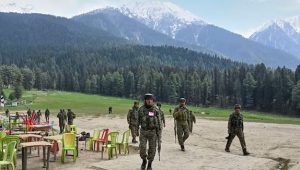Before Pahalgam attack, intel agencies had flagged potential targeting of tourists in Srinagar’s outskirts: Officials

New Delhi/Srinagar: Days before the deadly terror attack in Pahalgam, intelligence agencies had flagged the potential targeting of tourists especially those staying in hotels on the outskirts of Srinagar in the foothills of the Zabarwan range, officials in the know said Saturday.
This prompted a heightened security presence in these areas with top police brass camping in Srinagar to oversee combing operations around Dachigam, Nishat, and adjacent areas.
These areas gained attention and security forces increased patrolling because of a terrorist attack on a construction site in Gangangir, Sonamarg in October last year in which seven people including a doctor were killed. The area is located on the other side of Zabarwan range overlooking the Srinagar city.
Despite a two-week operation, security forces conducted extensive searches on the outskirts of Srinagar based on the intelligence, but these efforts did not yield any breakthroughs and the operation was called off on April 22, the day when terrorists targeted tourists in Pahalgam area killing 26 of them.
There were inputs to suggest that terrorists wanted to carry out such nefarious designs during the visit of Prime Minister Narendra Modi earlier last month to flag off the first train from Katra to Srinagar.
Definitely, Pakistan is not happy over the impending railway link that aims to connect the Kashmir Valley with the rest of the country, the officials cited above said.
However, they said the visit of the prime minister, earlier scheduled for April 19, was postponed due to adverse weather forecasts predicting high-speed winds in the Katra area.
The officials made it clear that while weather conditions are the sole reason for the postponement, fresh inauguration dates are expected to be announced soon.
The state and non-state actors sitting across the border never want the powerful visuals of flagging off the first train to get international attention and hence may have planned to overshadow the event with such barbaric killings, the officials said.
On the Pahalgam attack, the officials said what is emerging was that two local terrorists had already mingled with the tourists and as soon as the first shots were fired, they herded the tourists to a food court complex, where two other terrorists, reportedly Pakistanis, fired and killed 26 of them.
The aim of the attack seems to be creating fear among the citizens and possibly to lead to retribution attacks against Kashmiris elsewhere in the country, sources said.
But quick action by Chief Minister Omar Abdullah, who talked to top brass in New Delhi, prompted the directions being given to state governments to make sure the Kashmiri locals in their respective states were safe, they said.
The officials have also reported a worrisome trend in the type of terrorism in Jammu and Kashmir following the recovery of advanced weaponry like M-series rifles, sniper rifles, and armour-piercing bullets from encounter locations more and more, which are suspected to be leftover weapons and ammunition of NATO troops in Afghanistan.
The authorities also warned against depending on the tourist arrivals in Jammu and Kashmir solely as a marker of peace and noted the case of former chief minister Ghulam Nabi Azad, who had used tourist arrivals as an index of normalcy in the past.
Shortly after this statement, in May 2006, four tourists were killed, and six others injured when terrorists attacked a bus carrying tourists from Gujarat in Srinagar as it was reaching the Mughal Gardens.
According to the officials, in a conflict zone, tourism should primarily be viewed as an economic activity rather than a barometer for gauging normalcy.
Regarding reports about Baisaran not being granted clearance for opening to tourists, officials clarified that the area remains accessible throughout the year, except during the Amarnath Yatra or periods of heavy snowfall.
The Jammu and Kashmir administration had, in fact, issued a tender for Baisaran, which was awarded to an individual from South Kashmir last August for a three-year period at a cost of Rs 3 crore. The entire Baisaran meadow has since been fenced, and even a zipline facility has been established.
On the practice of blasting houses, recently used in counter-terrorism operations, the officials said it had been halted at the request of the elected government of Jammu and Kashmir.
New Delhi was advised to take note of the spontaneous protests in the entire Kashmir valley in the aftermath of Pahalgam killings on April 22 which were reminiscent of the public movements seen during the Nirbhaya case in New Delhi.
PTI
News